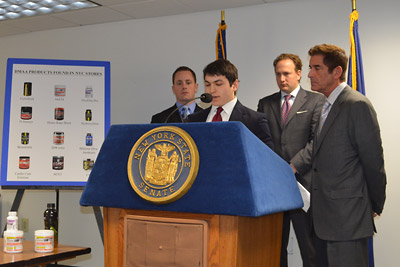Student spurs ban on nutritional supplement in N.Y.
By Tina Cormier

A student's troubling experience with weight loss and muscle-building supplements is influencing the regulation of a chemical stimulant in New York.
On Jan. 17 in Manhattan, Cornell student Gregory Maller '14 stood side by side with New York State Sen. Jeffery Klein as Klein introduced an amendment to the public health law that would prohibit the sale of any products containing dimethylamylamine (DMAA) in New York.
Maller, an undergraduate in the College of Agriculture and Life Sciences majoring in communication and minoring in nutritional sciences, had approached the senator after his own experience with DMAA as a high school student.
DMAA is a stimulant found in many over-the-counter muscle building and weight loss supplements. More potent than the now-banned Ephedra, DMAA works like a rush of adrenaline to boost metabolism, concentration and energy. It elevates blood pressure by narrowing blood vessels, which can result in shortness of breath, rapid heartbeat, headaches or other serious adverse effects.
At age 13, Maller was diagnosed with fatty liver disease and asthma, both reversible conditions related to obesity. "My doctor warned me that if I kept gaining weight, I could ultimately develop even more life-threatening health complications," he said.
As a high school freshman, he wanted to play sports and knew he had to lose weight, so he joined the wrestling team. Over the course of six months, he shed 80 pounds, leaving him emaciated and weak. He began looking for ways to build muscle and improve his athletic performance. "Advertisements, friends, online sources -- they all directed me toward supplements with the promise of quick results," Maller said.
Maller's parents became concerned when they found bottles of supplements laying around the house, and new ones arriving frequently in the mail. They questioned him about the ingredients and their potential side effects, and Maller realized he didn't have the answers.
These questions inspired Maller's interest in nutrition and supplementation. His own experience with DMAA-related side effects, including racing heart, headaches and intense come downs, fueled his commitment to get answers.
In 2011, with fellow CALS undergraduate Renan De Souza '14, he co-founded the Cornell Health and Nutrition Society (CHANS), a group dedicated to investigating and informing the public of the links between health, nutrition and athletic performance. "I want to promote knowledge about this -- what you're really putting in your body and what the effects could be," Maller said.
He sought advice from David Levitsky, professor of nutritional sciences and faculty adviser to CHANS. Levitsky lauded the group for wanting to apply their knowledge of nutrition to affect change in the public domain. "I can't think of a nobler task," he said.
By the summer of 2012, Maller had gathered enough information to approach Klein, then chair of the standing committee on Alcoholism and Substance Abuse. Klein immediately took an interest in Maller's research and findings.
At the Manhattan press conference announcing the amendment, Klein credited Maller with bringing this important public health issue to his attention. Maller noted: "I was very pleased. Sen. Klein's actions regarding DMAA could set an example for other states."
DMAA is banned by the World Anti-Doping Authority and the U.S. military, as well as in the U.K., Canada, Australia and New Zealand. The FDA is investigating the safety of DMAA but has yet to issue a ban.
Tina Cormier is a freelance writer for the College of Agriculture and Life Sciences.
Media Contact
Get Cornell news delivered right to your inbox.
Subscribe